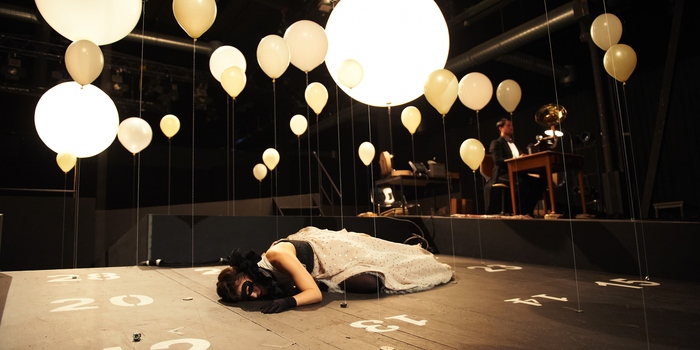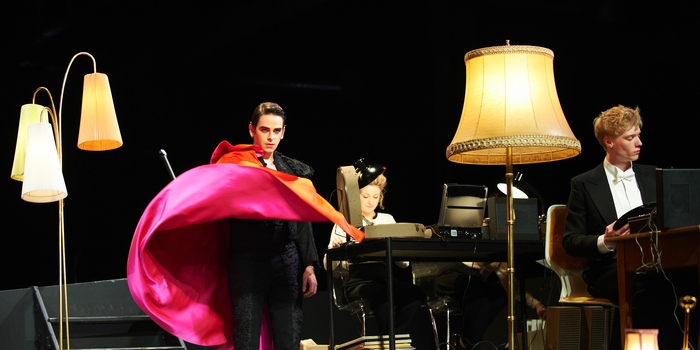Of: het vertrouwde wordt hier volkomen vreemd. Of: zinloosheid als het eerste principe omarmen. Honderd jaar na zijn geboorte staat John Cage centraal in HF-weekend.
Sinds Reinbert de Leeuw het speelde in het snelste praatprogramma op de Nederlandse televisie, is John Cage’s 4’33” in ons land een bekende compositie. Exact vier minuten en drieëndertig seconden speelt de muzikant geen enkele noot en hoort de toeschouwer niets anders dan de omgevingsgeluiden.

Waarom 4’33” en niet 5’12” of 1’18”? Simpel: de allereerste uitvoering nam nu eenmaal zoveel tijd in beslag, en sindsdien is dat de door Cage voorgeschreven lengte. Wat je hoort tijdens een uitvoering mag dan toeval zijn, de uitvoering is verder strikt vastgelegd.
In extreme vorm is dit precies wat gebeurt in Europera 3+4. Ook hier speelt het toeval een grote rol, maar dan wel met maar liefst 3256 en 275 aanwijzingen voor 70 en 30 minuten durende opera’s.
Nou ja, opera’s.
In Europera 3 horen we zes solisten zelfgekozen aria’s zingen, terwijl zes ‘bespelers’ van platenspelers een willekeurige selectie uit duizenden 78-toeren-platen maken, twee pianisten stukjes van Liszt’s operauittreksels spelen, op willekeurig momenten overstemd door de Truckera-tape – een collage van honderden operafragmenten die letterlijk oorverdovend is.

Het resultaat is geen opera, zelfs geen collage-opera, maar bijkans de complete Europese operageschiedenis. Tegelijkertijd. Door elkaar. Zonder verhaal, zonder ontwikkeling, zonder betekenis. Alsof, zoals musicoloog James Pritchett het omschreef, marsmannetjes hun visie op opera geven.
Totale chaos dus, want in tegenstelling tot 4’33” is hier geen sprake van bijna stilte, maar een bonte kakofonie, een totale sensory overload, zeker voor wie geen marsmannetje is, maar zelf ook een hoofd vol operafragmenten heeft. En dat is ook de bedoeling.
In Het spinsel van de eenzaamheid verwijst Paul Auster – in wiens werk het toeval ook een grote rol speelt – naar een passage uit Oorlog en vrede waarin Tolstoj opera tot absurditeit reduceert door simpelweg te beschrijven wat hij ziet:
In de tweede akte stonden er monumenten van bordkarton op het toneel, en een rond gat in het achterdoek moest de maan voorstellen. De voetlichten waren afgedekt en er werden lage tonen gespeeld door de blazers en de contrabas, toen er een aantal mensen van beide zijde van het toneel opkwam, met zwarte mantels aan en zwaaiend met dingen die er uitzagen als dolken. Toen renden andere mannen het toneel op en begonnen het meisje weg te sleuren dat eerst in het wit gekleed was en nu in het lichtblauw. Ze namen haar niet meteen mee, maar brachten lange tijd zingend met haar door, tot ze haar ten slotte toch wegsleepten en in de coulissen werd er drie keer op iets metaalachtigs geslagen en iedereen knielde en zong een gebed. Al deze handelingen werden herhaaldelijk onderbroken door de enthousiaste kreten van het publiek.
Ah, ok, opera is absurd en John Cage wil dat ook nog maar eens laten zien. We snappen het. Maar waarom in deze vorm?
Gelukkig helpt Paul Auster. Na de passage gewijd aan Tolstoj vervolgt hij:
Zoals iedereen smacht hij naar een betekenis. Zoals bij iedereen is zijn leven zo gefragmenteerd, dat hij elke keer dat hij een samenhang ziet tussen twee fragmenten, verleid wordt hierin naar een betekenis te zoeken. De samenhang bestaat. Maar door hem betekenis te geven, door achter het naakte feit van zijn bestaan te kijken, zou er een denkbeeldige wereld in de echte wereld worden gebouwd, en hij weet dat deze geen stand zou houden.
Precies dit gebeurt. Cage verleidt elke luisteraar, of hij of zij nu wil of niet, de verschillende fragmenten te herkennen en ze aan elkaar te knopen, betekenis te geven. Raad de plaat, maar dan in extreme vorm. Niet geheel toevallig gingen ook opvallend veel gesprekken in de pauze daarover.

Maar dat is onzin. Luchtkastelen bouwen. Je moet het ook helemaal niet willen, die fragmenten herkennen. Het vertrouwde wordt hier volkomen vreemd. Want dat ik na een enkele toetsaanslag de Parsifal-fragmenten herkende, heeft weinig met deze uitvoering van Europera te maken, maar alles met toevallige gegeven dat Wagners opera dinsdag op mijn agenda staat. Zelfs dat in deze versie van Europera 4 het na de pauze lijkt alsof het genre ten grave wordt gedragen, compleet met rouwkrans, is geforceerd zoeken naar een betekenis.
Op zijn dapperste momenten omarmt hij zinloosheid als het eerste principe, concludeert Auster op bijna Boeddha-achtige wijze. Ook daar had Cage iets mee. Net als Wagner in Parsifal, zij het via Schopenhauer. Daarover schreef Jonathan Harvey weer een opera, Wagner dream, die de wereldpremière beleefde in Amsterdam, tijdens het Holland Festival.
Maar daar ga ik weer, als een op hol geslagen Victrola, overal maar verbanden zoeken.

Reacties zijn gesloten.